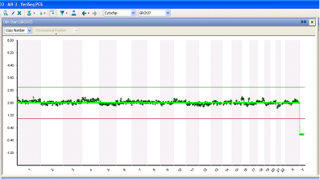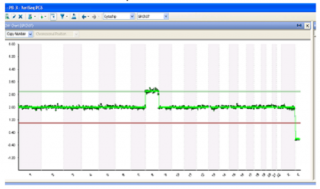When do chromosome errors arise in oocytes?
Oogenesis (egg formation) is an error prone process in humans. Most errors affect the final stages of egg maturation, just before it is released from the ovary. As women age the risk of an oocyte with abnormal chromosomes (aneuploidy) increases because by then the egg is an ‘old’ cell.
We have applied molecular cytogenetic techniques and most recently next generation sequencing to study the DNA of oocytes to find out exactly when errors occur. This has shown that a significant amount of aneuploidy is in fact already present in oocytes in the early embryo, leading to a high risk of chromosomally abnormal eggs irrespective of the mother’s age.This provides an explanation for why some chromosomally abnormal babies are born to younger women.
In future we plan to investigate how the woman’s genes affect this early aneuploidy.
 Metaphase II oocyte - Euploid
Metaphase II oocyte - Euploid

 1st Polar Body - Gain of chromosome 8
1st Polar Body - Gain of chromosome 8

Markers of oocyte and embyro quality
Our group has been studying morphological and genetic features of human oocytes and preimplantation embryos to identify markers of quality the could be used to assess the likelihood of successful IVF treatment. We have investigated the expression of DNA repair genes and also miRNA that target these genes in preimplantation embryos with the aim of comparing expression with embryo morphology. In particular we have been investigating the parental origin of RNA transcripts of these genes to determine if mutations in the maternal or paternal copies of these genes have different detrimental effects on the development of the early embryo.
Interaction of the nuclear and mitochondrial genome in preimplatation embyros
Mitochondrial function is important in embryonic development. The functional activity of mitochondrial is determined by maternally inherited mitochondrial DNA encoded genes as well as nuclear genes that are inherited from both parents. We have been investigating the interaction of these genes in order to determine whether a mismatch between the mitochondrial and nuclear genome can lead to poor embryo development and result in infertility.
 Close
Close

